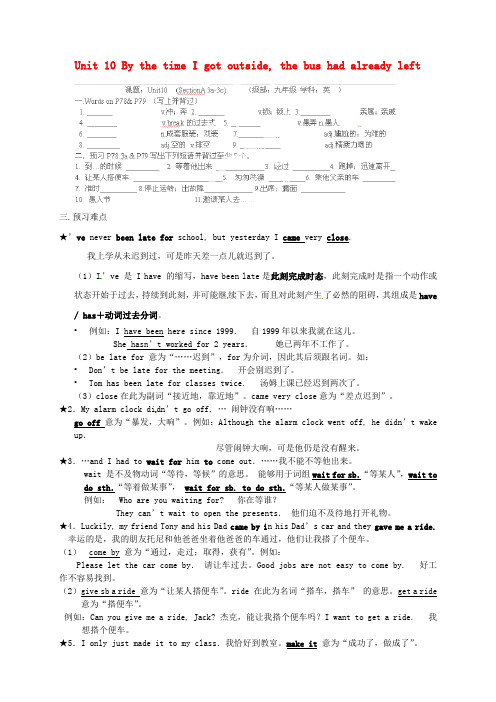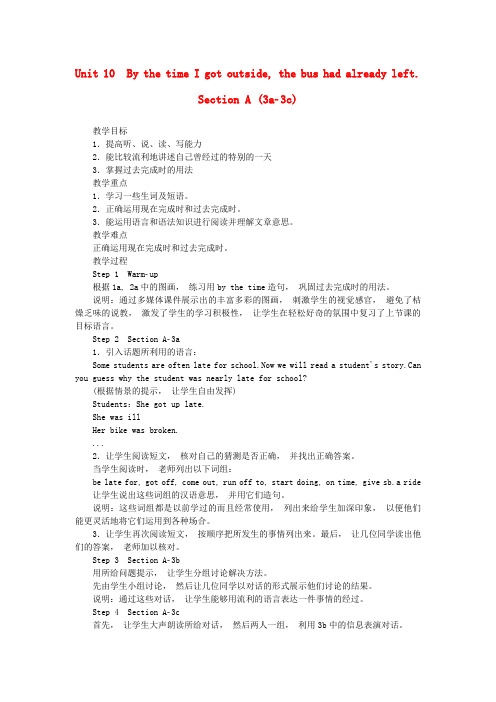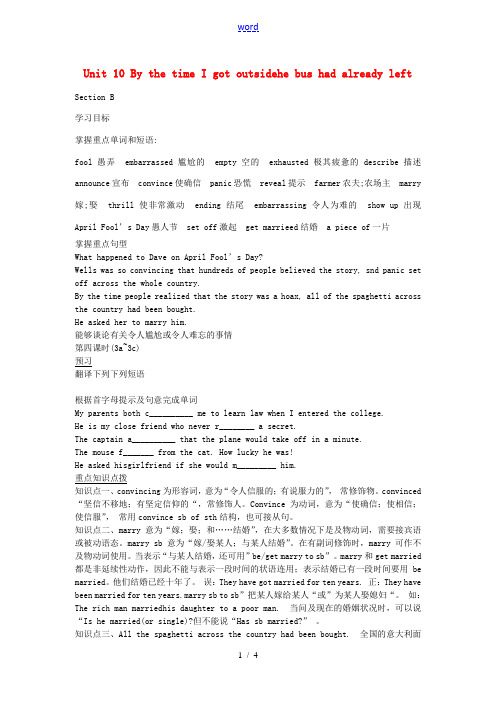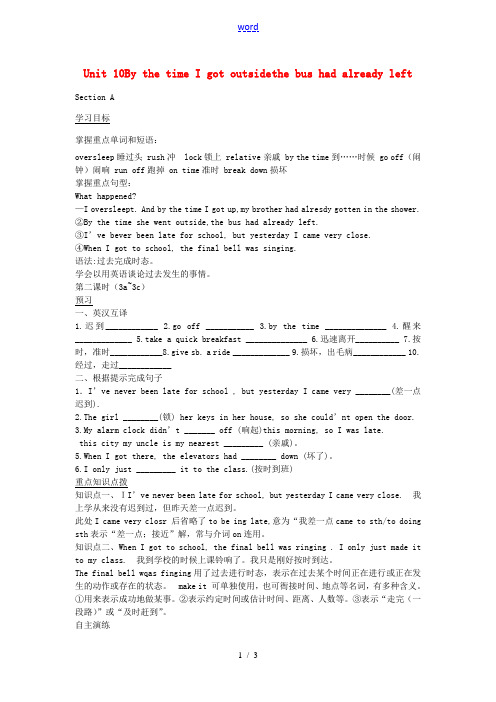九年级英语全册 Unit 10 By the time I got outside,the bus had already left Period 1导学案
- 格式:doc
- 大小:57.00 KB
- 文档页数:3

Unit 10 By the time I got outside, the bus had already left三.预习难点★’ve never been late for school, but yesterday I came very close.我上学从未迟到过,可是昨天差一点儿就迟到了。
(1)I’ve 是 I have 的缩写,have been late是此刻完成时态,此刻完成时是指一个动作或状态开始于过去,持续到此刻,并可能继续下去,而且对此刻产生了必然的阻碍,其组成是have / has+动词过去分词。
•例如:I have been here since 1999.自1999年以来我就在这儿。
She hasn’t worked for 2 years.她已两年不工作了。
(2)be late for 意为“……迟到”,for为介词,因此其后须跟名词。
如:•Don’t be late for the meeting.开会别迟到了。
•Tom has been late for classes twice. 汤姆上课已经迟到两次了。
(3)close在此为副词“接近地,靠近地”。
came very close意为“差点迟到”。
★2.My alarm clock di dn’t go off, … 闹钟没有响……go off 意为“暴发,大响”。
例如:Although the alarm clock went off, he didn’t wake up.尽管闹钟大响,可是他仍是没有醒来。
★3.…and I had to wait for him to come out.……我不能不等他出来。
wait 是不及物动词“等待,等候”的意思。
能够用于词组wait for sb.“等某人”,wait todo sth.“等着做某事”,wait for sb. to do sth.“等某人做某事”。

Unit10 By the time I got outside, the bus had already left.知识目标1. 掌握以下词汇和短语:wake, woke, woken,run off, fortunately, unfortunately, go off, rush, run off, on time, in time, lock, break down, broke, broken, speak, spoke, spoken, relative, give sb a ride,2. 掌握并会运用下列重要和句型:By the time he got there, the film had already been on ten minutes.When I reached the bus station, I realized that I had left theticket at home.能力目标1. Train the students’ reading skill with target language.2. Train the students’ speaking skill with target language.情感目标1. Have you ever done anything carelessly?2. Share your story with your friends.【重点难点】重点:1. Guide the students to read the article in activity 3a.2. Help the students do the oral practice with the target language.难点:1. Help improve the students’ reading skill by Activity 3a.2. Help the students describe what has happened to them with the target language.【教学过程】I. 复习热身1. 检查生词预习1) 正音: Ask the students to read the words by themselves, then correct their mistakes.2) 听写: wake, woke, woken,run off, fortunately, unfortunately, go off, rush, run off,on time, in time, lock, break down, broke, broken, speak, spoke, spoken,relative, give sb a ride,2. 自由交谈1) Revise what happened to Tina by asking several students to tell the story.2) Revise the three forms of the verbs in Grammar Focus by asking four students to write them outon the blackboard.3) Check homework by asking one or two to read their own endings of the stroy.4) Check homework by asking some students to read the sentences which they made.Ⅱ. 阅读训练 3aRead the story and write the events in the correct order. Ask the students to read the instructions together.1. Fast reading:Ask the students to read the article quickly and find the main idea of the passage.The article is a story about a student. It is his daily life. Read it after the tape, underlining all the expressions and circling the uses of past perfect.2. Careful reading:1) Tell the students to read the article carefully and silently.2) Ask the studentsto plete the work by themselves. Then discuss their answers in pairs. In a minute,ask some students to report their answers to the class.3)Write the answers on the blackboard as they report, putting the events in the correct order. Answers:1. alam clock didn’t go off2.father went into bathroom3.woke up late4. took shower5.had some breakfast6.bus left7.ran to bus stop 8.started walking9.got a ride with a friend10.bell ringing11. got to school 12. got to class3. Oral reading:First, the teacher play the tape. Then ask the students to follow the tape. At last let themread the article by themselves. Check up some students.4. Intensive reading:Askthe students to read it carefully again. Explain the important points.1)我上学从来不迟到,但昨天我差点迟到了.I’ve never been late for school, but yesterday I came very close. close 在本句中做副词,意为“接近地;紧密地”如:She came close to him. I live close to the shops.另外: close 还可以做形容词意为“亲近的;密切的”.如:他是我亲密的朋友. He is my close friend.英语同法语很接近. English has a close affinity to French.2)公共汽车坏了。

Unit10 By the time I got outside,the bus had already left.【教学目标】知识目标1. Learn the important words and phrases:be fooled by, believe, believeable,across the whole country, all over the country, marry sb, get married, announce, describe, so that, such that, thousands of, convincing, panic, set off, authority, reveal, hoax, flee/fled/fled, a piece of paper, show, reply, ending , a piece of -- 2. The reading passages about April Fool’s Day.3. Write stories happened on April Fool’s Day. 能力目标1. Train the st udents’ reading skill.2. Train the students’ writing and speaking skills.情感目标:Try to collect the jokes happened on April Fool’s Day and share them with your friends.【重点难点】重点1. He described that they landede and told how they were moving across the United States.2. …famers in Italy had stopped growing spaghetti.3. …announced that aliens from Mars had landed on the earth..难点:1. Help the students understand the three articles.2. Help the students write the stories happened on April Fool’s Day.【教学过程】Ⅰ. 复习热身1. 检查生词预习1) Ask the students to read the words by themselves, then correct their mistakes.2) Then dictate some words:be fooled by, believe, believeable,across the whole country, all over the country, marry sb, get married, announce, describe, so that, such that, thousands of, convincing, panic, set off,authority, reveal, hoax, flee/fled/fled, a piece of paper, show, reply, ending , a piece of -- 2. 自由交谈1) Revise the three boy’s stories happened on April Fool’s Day.Ask three different students to tell their stories to the class.2) Check the homework.Ask some students to read their stories and conversations to the class.Then have them check each other’s homework in pairs.Ⅱ. 阅读训练1. Fast reading:T: Read the article to the students. And ask them to find the main idea.Guess which of these stories is the most believable.Guess why.Guess Which is the least believable.Guess why.2. Careful reading:1) Ask the students to read the passage carefully. Answer the following question.Q:Why do you think it is the most believable or the least believable?2) They may say like this:I think it is believable because the exact time and person’s name are given in the first sentence.I don’t think it’s believable because I think no one dared to fool the people like that.3) Check the answers.3. 朗读:教师首先播放录音,学生跟读,然后学生自由朗读。

Unit 10 By the time I got outside, the bus had already left.Section A (3a3c)教学目标1.提高听、说、读、写能力2.能比较流利地讲述自己曾经过的特别的一天3.掌握过去完成时的用法教学重点1.学习一些生词及短语。
2.正确运用现在完成时和过去完成时。
3.能运用语言和语法知识进行阅读并理解文章意思。
教学难点正确运用现在完成时和过去完成时。
教学过程Step 1 Warmup根据1a, 2a中的图画,练习用by the time造句,巩固过去完成时的用法。
说明:通过多媒体课件展示出的丰富多彩的图画,刺激学生的视觉感官,避免了枯燥乏味的说教,激发了学生的学习积极性,让学生在轻松好奇的氛围中复习了上节课的目标语言。
Step 2 Section A3a1.引入话题所利用的语言:Some students are often late for school.Now we will read a student's story.Can you guess why the student was nearly late for school?(根据情景的提示,让学生自由发挥)Students:She got up late.She was illHer bike was broken....2.让学生阅读短文,核对自己的猜测是否正确,并找出正确答案。
当学生阅读时,老师列出以下词组:be late for, got off, come out, run off to, start doing, on time, give sb.a ride 让学生说出这些词组的汉语意思,并用它们造句。
说明:这些词组都是以前学过的而且经常使用,列出来给学生加深印象,以便他们能更灵活地将它们运用到各种场合。
3.让学生再次阅读短文,按顺序把所发生的事情列出来。

Unit 10 By the time I got outsidehe bus had already left Section B学习目标掌握重点单词和短语:fool愚弄 embarrassed尴尬的 empty空的 exhausted极其疲惫的 describe描述announce宣布 convince使确信 panic恐慌 reveal提示 farmer农夫;农场主 marry 嫁;娶 thrill使非常激动 ending结尾 embarrassing令人为难的 show up出现April Fool’s Day愚人节 set off激起 get marrieed结婚 a piece of一片掌握重点句型What happened to Dave on April Fool’s Day?Wells was so convincing that hundreds of people believed the story, snd panic set off across the whole country.By the time people realized that the story was a hoax, all of the spaghetti across the country had been bought.He asked her to marry him.能够谈论有关令人尴尬或令人难忘的事情第四课时(3a~3c)预习翻译下列下列短语根据首字母提示及句意完成单词My parents both c__________ me to learn law when I entered the college.He is my close friend who never r________ a secret.The captain a__________ that the plane would take off in a minute.The mouse f_______ from the cat. How lucky he was!He asked hisgirlfriend if she would m_________ him.重点知识点拨知识点一、convincing为形容词,意为“令人信服的;有说服力的”,常修饰物。

Unit 10By the time I got outsidethe bus had already left Section A学习目标掌握重点单词和短语:oversleep睡过头 rush冲 lock锁上 relative亲戚 by the time到……时候 go off(闹钟)闹响 run off跑掉 on time准时 break down损坏掌握重点句型:What happened?—I oversleept. And by the time I got up,my brother had alresdy gotten in the shower.②By the time she went outside,the bus had already left.③I’ve bever been late for school, but yesterday I came very close.④When I got to school, the final bell was singing.语法:过去完成时态。
学会以用英语谈论过去发生的事情。
第二课时(3a~3c)预习一、英汉互译1.迟到____________2.go off ___________3.by the time ______________4.醒来_____________5.take a quick breakfast ______________6.迅速离开__________7.按时,准时____________8.give sb. a ride _____________9.损坏,出毛病____________ 10.经过,走过____________二、根据提示完成句子1.I’ve never been late for school , but yesterday I came very ________(差一点迟到).2.The girl ________(锁) her keys in her house, so she could’nt open the door.3.My alarm clock didn’t _______ off (响起)this morning, so I was late.this city my uncle is my nearest _________ (亲戚)。
Unit 10 By the time I got outside,the bus had already left理解背诵下列短语1.by the time到..时候2.go off 闹响3.run off/run away跑掉离开4.on time准时5.break down损坏6.show up出席露面7.April Fool's Day愚人节8.set off激起引起 9.get married结婚10. by the time到...时候11. a piece of一片一块12.The alarm clock went off just now. 刚才闹钟响了13.rush at sb朝某人冲奔 rush out of冲出...地方14.on time准时 in time及时15.The door is locked. 门被锁上了16.feel/be/get exhausted=feel stressed out 筋疲力尽17.announce sth / that从句宣布某事18.have a sad ending 有个悲伤的结局19.flee-fled-fled逃离 flee from + 地点从某地逃离 flee away逃离/逃跑20.set off激起 set off=set out 出发/起程21.reveal a hoax揭露一个谎言22.marry sb=get/be married to sb和某人结婚23.ask sb to marry sb求婚24.in one's forties在某人的四十多岁25.have a happy ending 有个美好的结局26.feel embarrassed感觉尴尬 an embarrassing thing一件尴尬的事27.fall asleep睡着28.look stressed out看上去筋疲力尽29.get in the shower =go into the bathroom 洗澡 get out of the shower洗完澡 take a quick show洗一个快澡30.get dressed穿衣31.run all the way to school 一路跑向学校32.run back to school 跑回学校33.get outside出去34.get to school 到达学校34.leave one's sth at +地点把某人的某物落在某地35.make it (to sth) 来的及某事36.be late for school上学迟到e very close来的非常紧凑 be close to sb与某人亲密38.wait for sb等待某人e out出版/出来40.run off to迅速离41.start doing sth 开始做某事42.in one's car=by car乘车43.give sb a ride 顺便载某人一程44.the final bell 最后的铃声45.invite sb to do sth 邀请某人做某事46.stay up late 熬夜到很迟47.April Fool 傻瓜48.fool sb愚弄某人49.happen to sb发生在某人身上50.change the clock to an hour earlier 调整闹钟提前一个小时51.stay up all night studying熬夜学习52.a radio program一个广播节目nd on the earth在地球着陆54.move across穿过55.so convinced that...如此确信以致...56.hundreds of成百上千 thousands of成千上百57. run to the local supermarket58.stop doing sth停止做某事59. no more 不再60.invit sb onto one's show 邀请sb上sb的节目61.be thrilled非常兴奋62.lose both A and B 失去A和B一.用动词的适当形式填空(每题1分,共20分)1. We _____________ (paint) the house before we ______________ (move) in.2. That rich old man _____________ (make) a will before he _____________ (die).3. Paul __________ (go) out with Jane after he __________ (make) a phone call.4.The Reads __ ______ (have) lunch when I ________________(get) to their house.5.When I ______________(arrive) at the station, he ____________________(leave).6.We _______________(learn) about 4000 English words by the end of last term.7. I waited until he _______________(finish) his homework.8. We were surprised at what she ________already ______(do)9.She _________(not go) to Qingdao because she ____________ (go) there before.10. He ______________(not tell) you the news yet.11. He said he _____________already_________(give) the book to the teacher.12. She told me she _________________(be) to Beijing three times.13.It ta kes me half an hour __________ (walk) to work every day.14.If it __________ (be) fine, we’ll go fishing tomorrow.15.He ___________ (live) in Beijing since he was eight years old.二.感叹句专练(填入what, what a, what an或how)1.______ important information it is!2.______ cold weather it is at the South Pole!3.______ great day July 1,1997 was!4 very careful worker Mike is!5.______ honest Angela is!6.______ useful work they did!7.______ nice flowers! Where did you pick them?8.______ beautiful Nanjing Road Walkway looks at nig ht!9.______ lovely weather it is today!10.______ exciting news he has told me!三、单项选择()1.-Did you see Jim at the party?-No, he_____________by the time I got there.A.had been awayB.has lef tC.had leftD.was leaving( )2.No one___________ to yesterday’s party except lucy.A.was invitedB.ha s invitedC.has been invitedD.had been invited( )3.Hellen____________for two weeks.A.was awayB.has left for the USAC.has gone to the U SAD.has been away( )4.My aunt_________until she was forty.A. got marriedB.didn’t maryC. wo uld marry.D.wasn’t marrying( )5.I’m waiting for Jim______ping-pong with me.to play B.plays C.is pla ying D.played( ) 6.They had learnt two thousand English words________last week.A.in the end ofB. by the end ofC.in the endD. at the end of( )7.Some students in Class One are playing football.What about__________.others B.another C.the other D.the others( )8.Ihad known about it before I_____ about it.A.had toldB.has been toldC.was toldD.would be told( )9.My alarm clock was broken. It didn’t_______This morning.e outB.go offC.take offD.set off( )10.Not only I but also Lucy________been to Beijing before.A.haveB.hasC.isD.had( )11.The dress_________by my uncle looks very nice.A.was boughtB.boughtC.had boughtD.has bought( )12.My aunt and uncle___________for two years.A.have got marriedB.have marriedC.have been marriedD.got married。
班级_______ 姓名_________ 日期_____【学习目标】1. 通过阅读训练,培养学生获取信息的能力,同时巩固句型和扩大词汇量。
2.引导学生欣赏和积累优美、正确、地道的语言材料,为口语和书面表达奠定基础。
3.通过阅读,了解到西方国家愚人节发生的事,并引导学生理智地分析所发生的事件。
【学习过程】导学1.announce v.宣布;宣告;其后可接名词或that 从句。
eg .I hope to announce the winner at once .我希望马上宣布胜利者的名字。
The captain announced that the plane was going to land .机长宣布飞机就要着陆了。
导学2. set off (1)激起;引起 eg .The question set off a lively discussion.(2) 动身;出发;启程相当于set out 。
eg .The Greens will set off (out) on a journey around the world . 格林一家将要出发去环球旅行。
导学 3. flee v. 逃;逃走 flee to somewhere 逃往某地;flee somewhere 逃出某地;eg .They fled to America.他们逃往美国。
During the war ,thousands of people fled the country . 在战争其间,成千上万的人逃离了祖国。
导学 4. sell out 卖完;售光 eg Sorry . The cake has been sold out .抱歉,蛋糕已卖完了。
The shoes in the shop are sold out .店里的鞋全卖完了。
Sell sb sth =give sth to sb 卖给某人某物;导学5. marry v.“嫁,娶,与....结婚”。
Unit10 By the time I got outside, the bus had already leftPeriod1.【学习目标】知识目标:1.能预习并说出这单元的主要内容。
2.能运用并拓展本单元内容。
能力目标:能运用本节课内容解决中考题目,德育目标:积极参与课堂活动,并体验合作学习的快乐。
【重难点解析】1.过去完成时态的定义及构成。
2.过去完成时时态的运用。
【自学展示】:1写出下列单词的过去时和过去分词buy________ ____________ do___________ ____________eat__________ __________ give _________ __________tell __________ ________ make___________ __________put___________ ________ see_________ ______________write_______ __________ sleep____________ __________speak_________ _________ sing___________ ___________meet_______ _________ hear____________ __________【合作学习】1. 过去完成时(1) 构成:由助动词had + 过去分词构成否定式:had not + 过去分词缩写形式:hadn’t(2) 用法:某一时间或动作之前已经发生或完成了的动作。
(3) 它所表示的时间是“过去的过去”。
①表示过去某一时间可用by, before 等构成的短语来表示②也可以用when, before, after 等引导的时间状语从句来表示③还可以通过宾语从句或通过上下文暗示。
When I got there, you had already eaten you meal.当我到达那里时,你已经开始吃了。
Unit 10 By the time I got outside, the bus had already leftB.用所给动词的适当形式填空。
11. By the time I ______ ( ge t ) home, Mother ___ ___ ( finish ) cooking.12. _______ you _______ ( listen )to tapes yet? No. I _______ (listen) in an hour.13. You are interested in (draw). You might _____ (become) an artist in the future.What ______ your little brother ______( do )?--Don’t speak so loud. He _______.( sleep )(marry) his girl friend in two weeks’ time.water i n the swimming pool so you can’t swim here.(empty)the end of the party he ,everyone was excited. (show up)依照要求进行句型转换。
1. The bus had left by the time I got there.(改成否定句)The bus _______ ______by t he time I got there.2. He has already had breakfast. (改成一样疑问句)______he had breakfast________?3. The story was very interesting. I could never forget it. (归并为一句)The story was ________interesting__________ I could never forget it.4. She said, “I have read the book.”(改成同义句)She said that ______ read the book.5. The box is so heavy that he can’t carry it. (改成同义句)The box is __________heavy for him __________ carry.单项选择:( ) she arrived at school,she that it was Sunday.realize realized( ) ?—They have had an accident.is happened has happenedhave they happened were happened to them( ) little girl on the bus,so she is late for school.oversleep overslept( ) about 1,500 English wor ds by the end of last term.learn learned going to learn learned( ) Shan a nd Li Li are both doctors and they for ten years.ma rried got married been married married to( ) bought a digital camera online she would save a lot of time. (03扬州) that soon as matter thatso that与so...that...用法辨析一、so that引导目的状语从句时,表示“以便;为了”,从句中常利用can /could /may /might /will /would /should等情态动词或助动词;引导结果状语从句时,从句中一样不用can和may等词,在so that前能够用逗号,意思是“因此;因此”。
Unit10 By the time I got outside, the bus had already left
Period1.
【学习目标】
知识目标:1.能预习并说出这单元的主要内容。
2.能运用并拓展本单元内容。
能力目标:能运用本节课内容解决中考题目,
德育目标:积极参与课堂活动,并体验合作学习的快乐。
【重难点解析】
1.过去完成时态的定义及构成。
2.过去完成时时态的运用。
【自学展示】:
1写出下列单词的过去时和过去分词
buy________ ____________ do___________ ____________
eat__________ __________ give _________ __________
tell __________ ________ make___________ __________
put___________ ________ see_________ ______________
write_______ __________ sleep____________ __________
speak_________ _________ sing___________ ___________
meet_______ _________ hear____________ __________
【合作学习】
1. 过去完成时
(1) 构成:由助动词had + 过去分词构成
否定式:had not + 过去分词缩写形式:hadn’t
(2) 用法:
某一时间或动作之前已经发生或完成了的动作。
(3) 它所表示的时间是“过去的过去”。
①表示过去某一时间可用by, before 等构成的短语来表示
②也可以用when, before, after 等引导的时间状语从句来表示
③还可以通过宾语从句或通过上下文暗示。
When I got there, you had already eaten you meal.
当我到达那里时,你已经开始吃了。
By the time he got here, the bus had left.
到他到达这里时,汽车已经离开了用所给词的适当形式填空
【质疑导学】
过去完成时可以表示过去某一时刻或某一动作之前完成的动作或呈现的状态。
也就是说发生在“过去的过去”。
既然过去完成时的动作发生在过去某一时间之前,那么,使用过去完成时就必须先有这样一个过去的时间。
常用的几种方式:
1) by the time直到…时候
指从过去某一点到从句所示的时间为止的一段时间如:
By the time we got to his hou se, he had finished supper.
在我们到达他就已经吃完了晚饭。
构成:had+过去分词(had没有人称和数的变化)
2) 用介词by, before 等构成的时间短语.
We had learnt 20 English songs by the end of last month.
3) 用连词when, before, after或者短语by the time
引导的时间状语从句.从句的时态用过去时.
The plane had taken off when I reached the airport.
By the time I got up , my brother had left home.
eg.I ____ _________(finish) my homework before supper.
eg.By the end of that year Henry _____ ________(collect) more than one thousand foreign stamps.
到那年年底,亨利已经收集了一千多张外国邮票。
(过去时间是the end of that year)eg.When we got there, the football match ____ already _______(start).
当我们到那里时,足球比赛已经开始了。
(过去时间是when从句)
When I got to scho ol, I realized I had left my backpack at home.
我到学校时才发现把书包落在家了。
when当……时候,指过去的某一时间点。
从句用一般过去时,主句为过去完成时。
had left my backpack at home 这是一个过去完成时的句子,表示在过去某一时间或某一动作之前完成的动作或存在的状态。
到昨天下午三点,我们已经完成了工作。
She ____ ________(learn)a lot of English before she went to school.
在上学之前,她已经学会了很多英语。
[学习检测]
一.用所给词的适当形式填空
1 When they got to the station the train_____(leave)
2 By the time she got to class the teacher _______already_____(start)
3.I________(learn) some English before I came to this school
4.I _______(go) over his lessons when he took a rest
5 When he _________(get) to the cinema the film_______(begin)
二.根据汉意填空
1.I ______up late this morning?(醒来)
2.Have you ever ______ ?(睡过头)
3.After I got to the cinema, the film ______ already.(开始)
4.He ______ (完成) his homework before I came here.
5.By the end of last year, she ________(学)to swim for 3 years.
6. When I got home,mother___________(已开始饭) .
7. We ________(读完)five books _____________(到上月底为止)
8. He told me that he _________________(听说)the story before.
9.They __________________ (到达) the village before 8 last night.
10. ____________ (他出去时),the bus _________________已离开)
11. ___________她起床时,Her brother______ (已进浴室).
三.【中考链接】单项选择
1. ---- Did you see Mr Smith when you were in France?
---- No, when I ________ France, he had gone to China.
A, had arrived to B. arrived to C. had gone to D. got to
2. The pop singers _________ when I got to the music hall last night.
A. have left
B. were left
C. had left
D. left
3. They ________ since the factory opened.
A. had worked here
B. have worked here
C. worked here
4. Before the boss came back, the workers _________ the car.
A. repaired
B. has repaired
C. will repair
D. had repaired
5. The train _____ when I ____ to the station.
A. was left, was getting
B. left, had got
C. had left, got
D. left, got
【学后反思】。